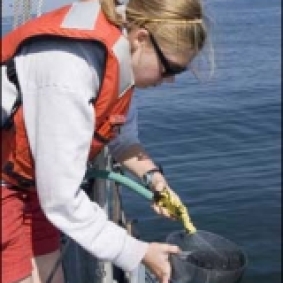Eight students will be presenting the summer work at the Ocean Sciences Meeting in March 2022!
Miriam Maynard-Ford, University of Mary Washington
Class Year:
2007Mentor:
Jeffrey Cornwell, Ph.D.Project Title:
Benthic Nutrient Flux Rates and Organic Degradation in the Blackwater National Wildlife Refuge
Abstract:
A preliminary study done on the biogeochemistry of the pond of Blackwater National Wildlife Refuge explored the rate of benthic nutrient fluxes and concentrations of porewater constituents. In a series of incubation experiments conducted in June and July, it was found that flux rates in the refuge pond are low with the exception of one location characterized by submerged intact peat. Of primary interest were the rates of denitrification and the possible presence of benthic microalgae. Denitrification was measured by changes in N2 in the water column over a period of 8 hours. Rates of denitrification (in μmol m-2h-1) were high at site 1(the submerged peaty site) and lower, but > zero at sites 2-4. Oxygen flux rates into the sediment were high, showing significant heterotrophy in the system. Following illumination, most oxygen fluxes remained negative, but a change in the rate at site 1 showed positive gross photosynthesis in both June and July, indicating the presence of benthic photosynthesis. Significant positive ammonium fluxes in the pond result from high levels of organic degradation, and were substantially higher at site 1 as well. Porewater profiles were analyzed for the presence of soluble reactive phosphorus, iron, ammonium, H2S, and methane gas at sites 1 and 4. Differences at each location were evident in the porewater profiles, as SRP was higher at site 1 than site 4. Porewater iron showed the opposite trend with higher levels at site 4. H2S and methane gas were both present in high levels at site 1. Results show that Blackwater is a unique and highly variable system, and more studies must be done to further investigate these parameters.



